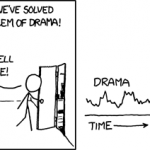
My parish here in DC is very lucky because, now that the summer’s over, we get to have Adult Sunday School after the 9am Mass with two of the Dominican friars from the House of Studies. The new semester started this past Sunday, and the first topic was just war theory. The Dominican who presented melded encyclicals, excerpts from the Catechism, Ecclesiastes, as well as the writings of Aquinas and Augustine. He cited this passage from chapter 12 of my patron saint’s City of God:
Whoever gives even moderate attention to human affairs and to our common nature, will recognize that if there is no man who does not wish to be joyful, neither is there any one who does not wish to have peace. For even they who make war desire nothing but victory,–desire, that is to say, to attain to peace with glory. For what else is victory than the conquest of those who resist us? and when this is done there is peace. It is therefore with the desire for peace that wars are waged, even by those who take pleasure in exercising their warlike nature in command and battle. And hence it is obvious that peace is the end sought for by war. For every man seeks peace by waging war, but no man seeks war by making peace. For even they who intentionally interrupt the peace in which they are living have no hatred of peace, but only wish it changed into a peace that suits them better. They do not, therefore, wish to have no peace, but only one more to their mind.
This passage seemed like the nation-level equivalent of Augustine’s most famous observation, from his Confessions:
Thou movest us to delight in praising Thee; for Thou hast formed us for Thyself, and our hearts are restless till they find rest in Thee.
In both of these writings, Augustine describes the human tendency to move turbulently, tumbling through philosophies and governments in an effort to find a stable point, where the choices we have made don’t blossom into contradiction and conflict. At the human scale, it is after Augustine enters deeply into some of his heresies that he is able to recognize them as false paths. His hunger (for God as it turned out) drove him both into and out of Manichaeism. As a mere spectator, considering a theology or philosophy in the abstract, it’s easy to hold it in abeyance — a possible solution to your problems, but not one you’ve ever examined too closely. It’s much harder to maintain that state of lukewarmness for a philosophy you’ve actually tried to live, whether or not you were sure it was the best philosophy going.
There is a real danger, in endless war, that we will never experience a peace to grow dissatisfied with. This is a reason I’ve sometimes been optimistic when groups like Hamas or the Muslim Brotherhood win elections, since, once they are asked to govern, they are being asked to serve their community in a different and more fruitful way than just by ousting the current government. It’s easier to expose the contradictions of an ideology when it exists in peacetime, amid the unglorious work of maintaining drainage pipes and coordinating schoolbuses. It stands on its own, instead of in contrast to the philosophy of the enemy.
Endless war footings distract us from the peace we were seeking at the beginning of hostility. And the pressure of being constantly in conflict can leave us excusing the flaws in the peace we’ve been working towards and the ideology that taught us to desire it. There is no moment of rest to live in the peace we keep talking about and to notice whether or not it is truly stable and restorative.
At the scale of nations, we have a limited ability to correct this error, working as individuals (though protesting and speaking out against wars and military actions that don’t bother envisioning the specific peace they seek is a start!) but, in our day to day life, we have more agency to make sure that our struggles are directed toward a proving time of peace, a quiet period where we will have a chance to notice if our movement has brought us closer to consolation and love.
Without times of silence and stillness, it’s almost impossible to double check our heading; flaws in our theology/philosophy/ideology are camouflaged by the noise and exhaustion of combat. As a half measure, if life makes it very hard to have peace, have a cease-fire. Take a little time (as the soldiers in World War I did at Christmas) to live as you would if you had made it past the rough point. Maybe that’s a day or a week of mindfully committing to the ethic you think is right, but hard to practice.
Provision yourself accordingly; it’s isn’t a trivial problem to carve out space and time and energy, but try to live in the peace you’re working toward for a little while, so you can notice if it’s worth fighting for.











